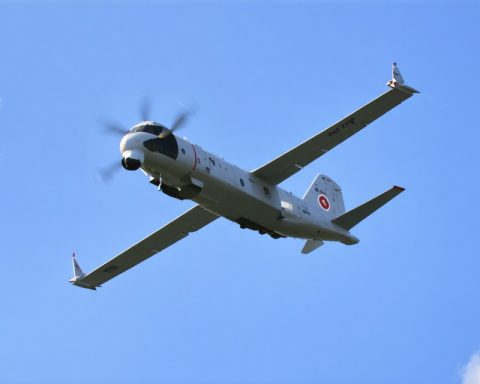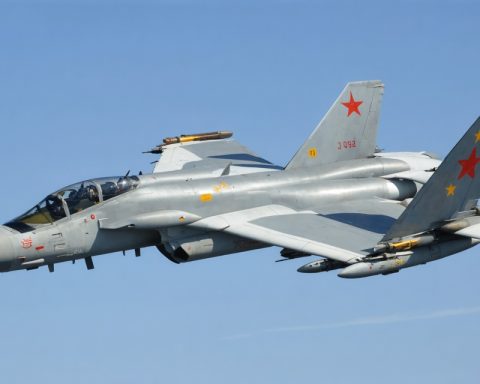In a move that captured headlines in September, the Israeli Air Force made the decision to deploy two F-35 jets to escort Prime Minister Benjamin Netanyahu’s plane during part of its return journey from the United Nations General Assembly in New York. This decision came amidst heightened security concerns, notably following the death of Hezbollah leader Hassan Nasrallah, which reportedly sparked a wave of apprehension within the Prime Minister’s circle, especially concerning potential missile threats.
Prior to these developments, Sara Netanyahu, the Prime Minister’s wife, expressed concern over possible attacks on the “Wing of Zion” aircraft. Sources revealed that she had initially requested fighter jet escorts for the entire trip to and from the United States. However, this request was not approved by the Air Force Commander.
The security narrative intensified post-Nasrallah’s elimination as fears of retaliation from Iran or Hezbollah mounted. This led to the approval of an escort for the flight’s final segment from Cyprus back to Israel. The Air Force later declined a request for visual documentation, ensuring the jets remained out of the photo frame.
In the media, the F-35 escort made waves, with the Prime Minister’s Office refuting claims of any special demands or interference from Netanyahu’s family regarding security arrangements. Official statements stressed that security procedures are governed strictly by professional assessments.
Adding to the complex security landscape, increased measures around Netanyahu and his family have been noted, amid continued tensions and security challenges. This has also impacted government operations, including relocating cabinet meetings for safety. As Netanyahu’s legal battles loom, security considerations remain central to the evolving political drama.
Unexpected Security Measures: How High-Stakes Politics Impact Everyday Lives
The Israeli Air Force’s decision to deploy F-35 jets as escorts during Prime Minister Benjamin Netanyahu’s return from New York signals more than just a precaution for political figures. It underscores ongoing regional tensions with global implications, highlighting the ripple effects on ordinary people, international relations, and military strategy.
Impact on Communities and Countries
This high-profile move puts a spotlight on the persistent and complex relationship between Israel and Hezbollah, escalating longstanding geopolitical tensions. The heightened security measures, perceived by many as necessary, also have indirect consequences for local communities and the broader Middle East region.
For communities bearing the brunt of these tensions, daily life can change dramatically with increased military activity. Air Force deployments and other heightened security protocols often translate into disruptions, fear of escalated conflict, and an overarching atmosphere of unease. On a broader scale, countries may find themselves re-evaluating security alliances and protocols in response to developments in the Israel-Hezbollah dynamic.
The Good and Bad of Enhanced Security
While some hail the use of advanced fighter jets like the F-35 for VIP protection as a testament to technological prowess and military readiness, others see it as an overreach fueled by excessive paranoia.
Advantages:
– Technological Superiority: The F-35 jets are among the most advanced military aircraft, providing superior protection during critical missions.
– Deterring Aggression: Visible airpower may deter potential aggressors, lessening the likelihood of confrontation.
– Boosting National Security: Enhanced security protocols can reassure citizens about their government’s commitment to safety.
Disadvantages:
– Escalation Risks: Demonstrating military might in sensitive regions can provoke further hostilities, turning tensions into outright conflicts.
– Resource Allocation: The financial and human resources devoted to such missions may be viewed as excessive, diverting attention and funds from other vital areas, such as social services or education.
– Public Perception: Measures seen as extravagant or unnecessary can erode public trust, particularly in nations grappling with socioeconomic challenges.
What Does This Mean for Future Security Policies?
As we reflect on these developments, several questions arise: How should nations balance security needs with diplomatic efforts? Are there risks associated with prioritizing advanced military solutions over dialogue or de-escalation strategies?
Answering the Call for Balance: A comprehensive approach to security might include not only advanced protective measures like deploying advanced jets but also encouraging diplomatic engagements to reduce tensions. Sustainable peace depends often on a balanced mix of deterrence and negotiation.
For more insights into global security dynamics and related technological advancements, visit relevant sources like Janes and U.S. Department of Defense.
The continuous interplay between politics, technology, and security remains crucial for strategists, policymakers, and the general public to navigate the complexities of our contemporary world effectively.












